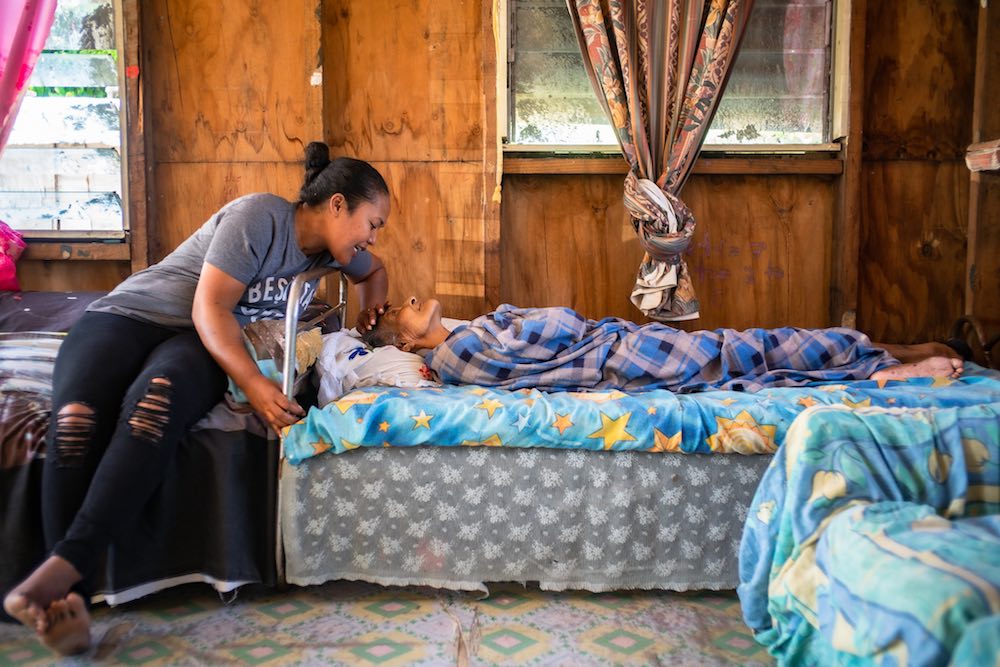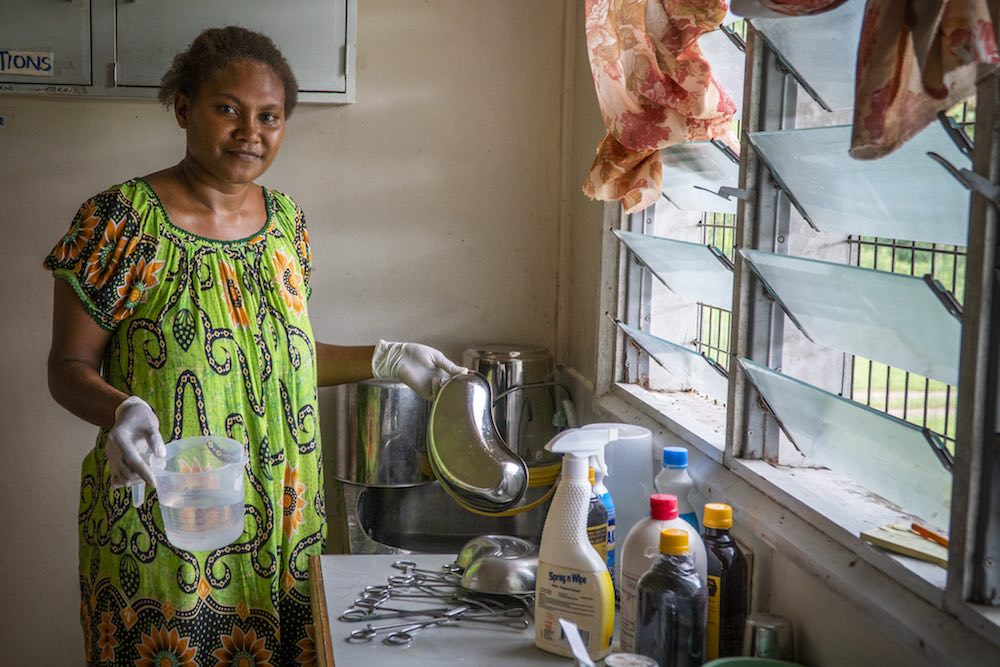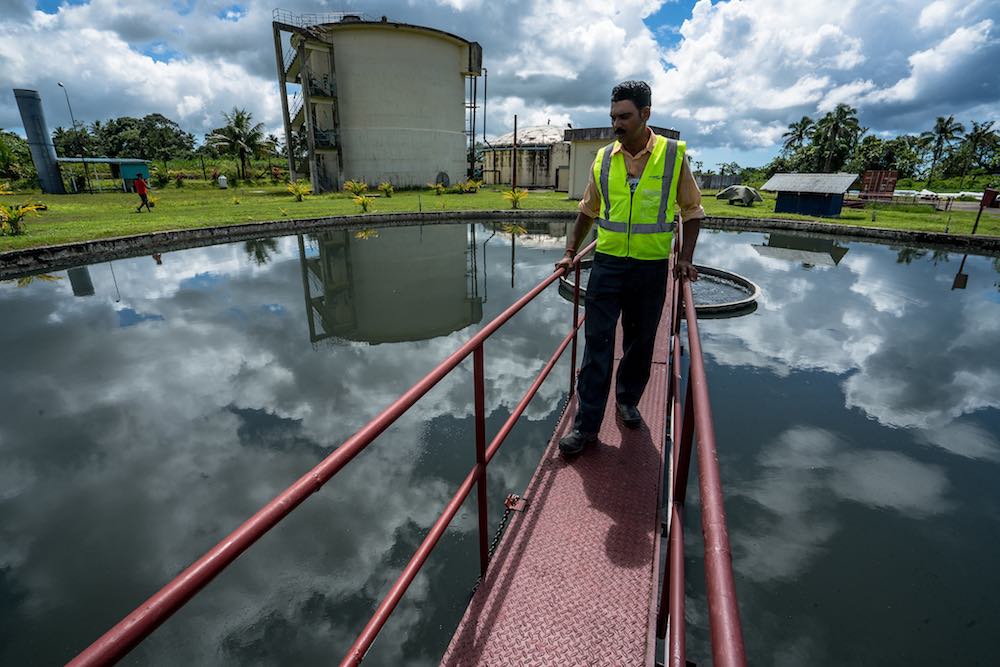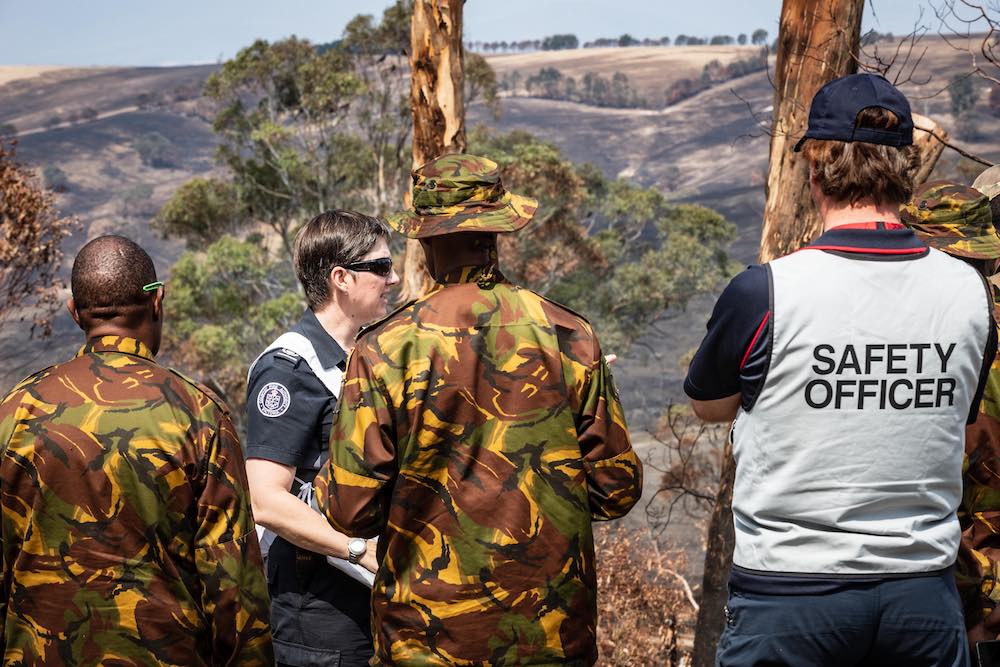Of all the regions in the world, the twin health and economic crises caused by the Covid-19 pandemic have the potential to hit the Pacific the hardest.
Pacific Island nations supported Australia during our bushfire crisis, sending members of their defence forces and making donations to communities in a much wealthier nation. This region is perhaps the most critical to Australia’s physical security – and a region which must be supported through the pandemic by a comprehensive Australian plan.
At latest count there are 266 confirmed cases of COVID-19 in Pacific island countries and seven deaths from the disease. The governments of at least 10 Pacific island countries have imposed states of emergency. Health workers with only a handful of ventilators at their disposal are bracing against more severe outbreaks. Travel throughout this vast and geographically dispersed region has been all but shut down, and populations already struggling with poverty are facing a grim economic outlook.
Perceptions in Pacific countries that Australia has let the region down at this time of need or is not listening to its Pacific partners could fundamentally compromise the Step Up.
The crisis will continue to unfold for some time yet out and will cast a long shadow over the countries of the Pacific.
There will be humanitarian, economic, social and political impacts – not only for the region itself, but also for Australia, which faces national security and geopolitical risks from an inadequate response to Covid-19 in the Pacific.
The coronavirus crisis has the potential to overburden weak local health systems. Healthcare systems in most Pacific countries suffer from a lack of resources, health professionals, basic equipment and infrastructure. In many countries, poor logistics, transport infrastructure and geographical isolation add to the challenges in providing health services in remote regions. Inadequate water, sanitation and hygiene infrastructure, and limited fresh water supplies in remote communities may also reduce the effectiveness of basic containment measures.

Some Pacific island nations’ economies face virtual collapse because of the pandemic.
Several nations are highly dependent on tourism, which has been shut down by travel restrictions. The most tourism-dependent economies are Fiji (where tourism comprises 17% of GDP), Samoa (23%), Vanuatu (40%), the Cook Islands (73%) and Tonga (10%), according to ANZ research and official figures.
Economic impacts are likely to go beyond tourism. The World Bank has identified the following additional economic risks for Pacific nations:
- Commercial fishing may be reduced due to travel restrictions;
- Fish exports may be affected by a global economic slowdown;
- Construction and infrastructure projects may be affected by availability of labour and materials;
- Remittances from Pacific nationals working abroad may slump;
- Slower global growth may impact commodity prices and resources exports;
- Global equity market declines may hit investment earnings of sovereign wealth funds which comprise significant sources of government revenue in Kiribati and Timor-Leste.
Covid-19 in the Pacific also presents risks for Australia’s national security and foreign policy interests. The Australian government’s participation in discussions by the Pacific Islands Forum on establishing a “Pacific Humanitarian Pathway on COVID-19” is to be welcomed.
However, the need for humanitarian assistance comes as Australia already faces pressure from the domestic impacts of the virus, which will rightly always be the first priority for Australian governments. Economic contractions in Pacific nations will pose risks for Australian interests, including:
- Direct impacts on Australian tourism businesses engaged with Pacific tourism;
- Pressures from Pacific partners to boost development assistance;
- Economic downturns may exacerbate the Pacific’s development challenges and increase state fragility;
- Loss of income, which could create social tensions with risks of instability and conflicts in Pacific countries;
- An impact on government budgets, which may increase the attractiveness of financial partnerships with China.
Papua New Guinea must be regarded as particularly vulnerable to the pandemic given the size of its population, its proximity to countries which have substantial outbreaks, and the lack of resources in its health system.
A priority for the Australian government in responding to the pandemic in the Pacific should be ensuring PNG receives urgent assistance to slow the spread of Covid-19. This assistance should be targeted at boosting the country’s healthcare resources and ability to test, contain, and treat the virus. Australia should provide direct support for such measures through its bilateral development assistance program. It should also urge speedy action by the International Monetary Fund, the World Bank, and the Asian Development Bank (ADB) on PNG’s current requests for funding for its Covid-19 response.

Strong performance by Australia in assisting Pacific countries with Covid-19 would support the Morrison Government’s Pacific Step Up and its foreign policy objectives.
By the same token, perceptions in Pacific countries that Australia has let the region down at this time of need or is not listening to its Pacific partners could fundamentally compromise the Step Up.
This matters because COVID-19 also has implications for great power competition in the Pacific. There are already competing narratives about the roles of China and the US in responding to the pandemic.
On the one hand, the role of China’s government in initially covering up the Covid-19 outbreak in Wuhan may cause some Pacific countries to question the Chinese authoritarian model and to be wary of further engagement and exposure to China, including debt exposure. On the other hand, Beijing is seeking to use the apparent containment of the outbreak in China to articulate a narrative about the effectiveness of its model of governance and to establish itself as the world’s “counter-Covid leader in word and deed.”
China is seeking to boost its soft power through providing material aid to countries affected by the pandemic, including in the Pacific. It has convened a video conference for more than 100 Pacific government Ministers and officials with senior foreign affairs and health officials in Beijing. Its ambassadors in Pacific countries have been staging photo opportunities as they hand over cheques to local officials from Beijing’s US$1.9 million China-Pacific Island Countries Anti-Covid-19 Cooperation Fund.
Given the humanitarian, economic, foreign policy and geostrategic interests at stake, Australia needs a comprehensive strategy for working with Pacific partners on Covid-19. While the Australian Government has taken a number of ad hoc steps to assist the Pacific, the Foreign Minister and the Minister for International Development and the Pacific have had little to say about the issues facing the Pacific, let alone articulating any coherent plan for assisting the region and advancing Australia’s interests.
There needs to be a comprehensive and coordinated Australian strategy. This should comprise three phases: immediate humanitarian assistance; medium term economic recovery; and longer-term investment in resilience.
The strategy should be developed and implemented in close partnership with Pacific countries and organisations. Ultimately, we must listen to the needs and priorities of our Pacific neighbours.
It requires senior Australian leadership from the Prime Minister, Cabinet Ministers and senior officials from Australia’s health, economic, foreign policy and defence agencies.
Phase one: immediate humanitarian assistance
The first phase would focus on containing the spread of the virus and responding to health and humanitarian needs, including economic needs such as the supply of essential goods including foodstuffs and fuel. Healthcare assistance would be a strong component of this phase.
Australia would provide funding, technical assistance, medical equipment, training, testing and personal protective equipment to hospitals and healthcare facilities in the Pacific. It would assist Pacific governments in providing advice and information to their communities on prevention strategies such as hygiene and social distancing.
Australia should also consider short term economic assistance, funded from the Australian Official Development Assistance (ODA) budgets and leveraging funding from multilateral development institutions.
Covid-19 has highlighted the problem of a lack of access to water and sanitation infrastructure in many Pacific communities.
Short term economic assistance should also be targeted at Pacific tourism businesses which have called for measures such as freezing debt repayment obligations to banks.
Australia’s corporate sector is leading by example here – ANZ Pacific has offered to defer repayments for home, business and personal loans for up to six months for customers affected by Covid-19 in Fiji, Vanuatu, Samoa, Tonga, Cook Islands and Kiribati.
Treasury, the Reserve Bank of Australia and the Australian Prudential Regulation Authority should provide support to Pacific regulators to facilitate such measures by local financial institutions.
Australia may also need to assist in providing a wider range of goods and equipment in short supply due to the impacts of the pandemic on travel, transport and global supply chains, given that many Pacific nations rely on imports for fuel and other essential commodities.
This phase would include Australia working with Pacific governments to ensure they gain access to the financial assistance being made available to developing countries by multilateral institutions and development banks.
Phase two: economic recovery
Australia should work on a Pacific economic recovery and rebuilding strategy with Pacific governments, the Pacific Islands Forum, other regional governments and groupings such as the G20, and the multilateral financial and development institutions.
Australian bilateral assistance will be able to support specific measures in consultation with Pacific countries. Australia can also provide technical assistance with the design of fiscal and monetary policy measures.

However, the scale of the economic fallout will require very substantial support from multilateral institutions such as the IMF, World Bank and ADB. Australia should play a leading role in advocating for the multilateral institutions to deliver economic and financial support for Pacific countries.
The recovery strategy should be multifaceted and could include:
- Fiscal measures to support Pacific citizens, including measures which are effective in assisting people who work in the informal sector and may not be reached by existing social support programs;
- A tourism recovery effort including marketing to traditional and new customer bases and temporary easing of government taxes such as airport taxes and passenger entry or exit charges to make the pricing of tourism products more attractive;
- Liquidity support for small and medium sized businesses;
- Bringing forward funds for infrastructure investments;
- Assisting governments to finance domestic economic and fiscal policy measures;
- Boosting Pacific labour mobility and migration opportunities to provide Pacific countries with enhanced flows of remittances.
The economic recovery strategy needs to reflect the specific circumstances of Pacific nations including their small population bases, lack of economic diversification, geographic isolation, remoteness from international markets and limited revenue bases and fiscal capacity of governments.
It also needs to reflect social needs including gender issues and the needs of disadvantaged and vulnerable groups such as people with disabilities, children and people in remote communities.
Phase three: building resilience
Over the next two to three years, Australia should consider the longer term implications of the pandemic for the Pacific.
The Covid-19 crisis has highlighted the vulnerabilities of our Pacific partners’ healthcare systems. This comes after several years in which the Coalition government’s ODA cuts have fallen more heavily on healthcare than on aid programs in physical infrastructure, trade facilitation and international competitiveness.
While the Coalition has increased Australia’s overall development assistance for the Pacific (by cutting aid significantly for East Asia and South Asia), it has also reoriented Pacific assistance to “hard” physical infrastructure at the expense of “soft” human infrastructure including health.
The Australian government needs to pause its review of its international development policy and reassess in the light of the pandemic’s lessons.

Development assistance needs build greater capacity in healthcare and to support economic and social resilience. In health there is a need to improve resources, skills and capabilities both in responding to public health emergencies and also to tackle the region’s ongoing challenges in non-communicable diseases and preventative health interventions.
Covid-19 has highlighted the problem of a lack of access to water and sanitation infrastructure in many Pacific communities. Climate change will put additional pressures on water and sanitation infrastructure as rising sea levels, storm surges, and high tides introduce saltwater into freshwater resources in low-lying Pacific atolls.
Infrastructure investments should include social infrastructure in areas such as water, sanitation and hygiene (WASH) that are less commercially attractive for private sector investors. Consideration should be given to earmarking a share of the $2 billion Australian Infrastructure Finance Facility for the Pacific for investments in health and WASH infrastructure.
If Australia genuinely wants to be the partner of choice for Pacific island nations – with all the benefits that will bring for our national interest – then how we contribute to their Covid-19 challenge in coming months will shape our future in this important region.
This is a test that the region desperately needs Australia to pass.
Pat Conroy

